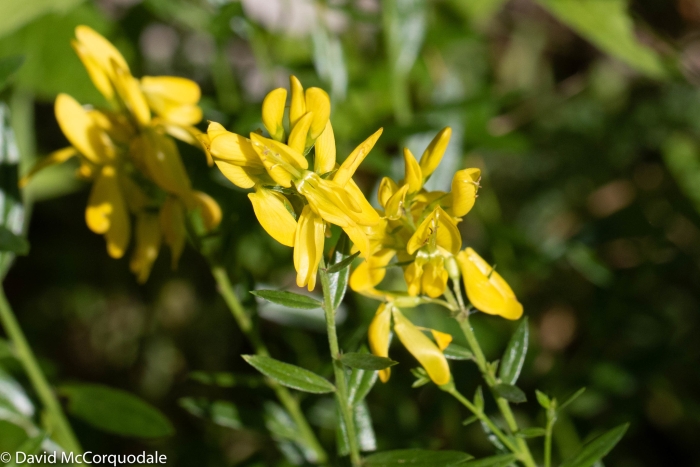Dyer’s Greenweed
(Genista tinctoria)
Dyer’s Greenweed (Genista tinctoria)
/
/

David McCorquodale
CC BY 4.0
Image By:
David McCorquodale
Recorded By:
Copyright:
CC BY 4.0
Copyright Notice:
Photo by: David McCorquodale | License Type: CC BY 4.0 | License URL: http://creativecommons.org/licenses/by/4.0/ | Rights Holder: David McCorquodale | Publisher: iNaturalist | Date Created: 2020-07-21T15:58:07-07:00 |





















































Estimated Native Range
Summary
Genista tinctoria, commonly known as Dyer’s Greenweed, is a deciduous shrub native to a variety of habitats including meadows, pastures, and open woodlands across Europe and Western Asia. It typically grows to 60–90 centimeters (24–35 inches) tall and can spread up to 100 cm (39 inches) wide. The plant has a bushy habit with slender green stems and small, lance-shaped leaves. From late spring to midsummer, it produces dense racemes of bright yellow, pea-like flowers that are highly attractive to bees and other pollinators.
Dyer’s Greenweed is valued for its vibrant yellow flowers and its historical use as a source of yellow dye. It is suitable for border planting, wildflower gardens, and as a component of naturalistic landscaping. It thrives in full sun and can tolerate a range of soil conditions, though it prefers well-drained soils. While it is drought-tolerant once established, moderate watering will encourage more lush growth. This plant can be propagated by seed or semi-hardwood cuttings. It is generally low-maintenance but can be susceptible to fungal diseases in humid conditions. Due to its potential invasiveness, it should be planted with caution outside its native range.CC BY-SA 4.0
Dyer’s Greenweed is valued for its vibrant yellow flowers and its historical use as a source of yellow dye. It is suitable for border planting, wildflower gardens, and as a component of naturalistic landscaping. It thrives in full sun and can tolerate a range of soil conditions, though it prefers well-drained soils. While it is drought-tolerant once established, moderate watering will encourage more lush growth. This plant can be propagated by seed or semi-hardwood cuttings. It is generally low-maintenance but can be susceptible to fungal diseases in humid conditions. Due to its potential invasiveness, it should be planted with caution outside its native range.CC BY-SA 4.0
Plant Description
- Plant Type: Shrub
- Height: 2-3 feet
- Width: 2-3 feet
- Growth Rate: Moderate
- Flower Color: Yellow
- Flowering Season: Summer
- Leaf Retention: Deciduous
Growth Requirements
- Sun: Full Sun
- Water: Medium
- Drainage: Slow, Medium
Common Uses
Bank Stabilization, Bee Garden, Bird Garden, Border Plant, Butterfly Garden, Drought Tolerant, Fragrant, Groundcover, Hummingbird Garden, Low Maintenance, Rock Garden, Showy Flowers
Natural Habitat
Native to meadows, pastures, and open woodlands across Europe and Western Asia
Other Names
Common Names: Dyer’s Broom, Woadwaxen, Woodwaxen, Ginestola, Farve-Visse, Färber-Ginster, Farber-Ginster, Varv-Leetpoosas, Pensasväriherne, Genêt Des Teinturiers
Scientific Names: , Genista tinctoria, Genista tinctoria var. tinctoria, Genista perrymondii, Genistoides tinctoria, Genista marginata, Genista sibirica, Corniola tinctoria, Cytisus tinctorius, Genista alpestris
GBIF Accepted Name: Genista tinctoria L.